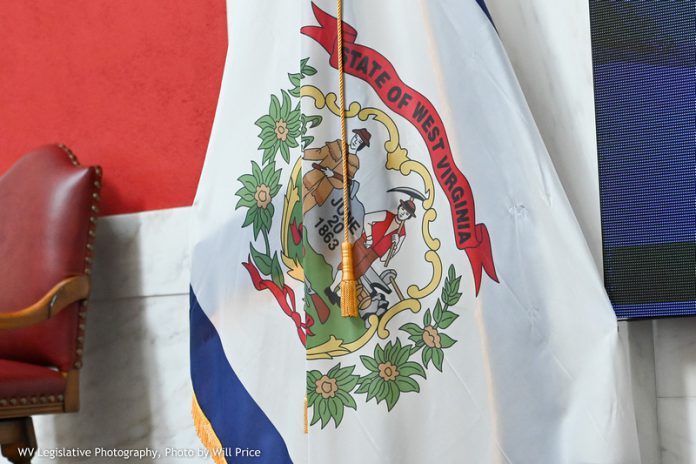Legislative Oversight Commission on Education Accountability 11/14/2021
The Legislative Oversight Commission on Education Accountability received several reports from the West Virginia Department of Education. The report on harassment, intimidation and bullying within schools showed last year’s overall numbers as lower due to being out of the classroom. However, the number of discipline referrals for harassment, intimidation or bullying was at 1.6% last year, which is on par with other years. The report showed that children were harassed, intimidated, or bullied for their sexual orientation, race, gender, disability, etc. The majority (57 percent) of referrals were from middle school students, while 19 percent were from elementary school students and 24 percent were from high school students. Ninety-two percent of referrals were since offenders. Eighty-two percent of the offenders were male, and eighty-six percent were white students. Most of the cases involved were within grade levels.
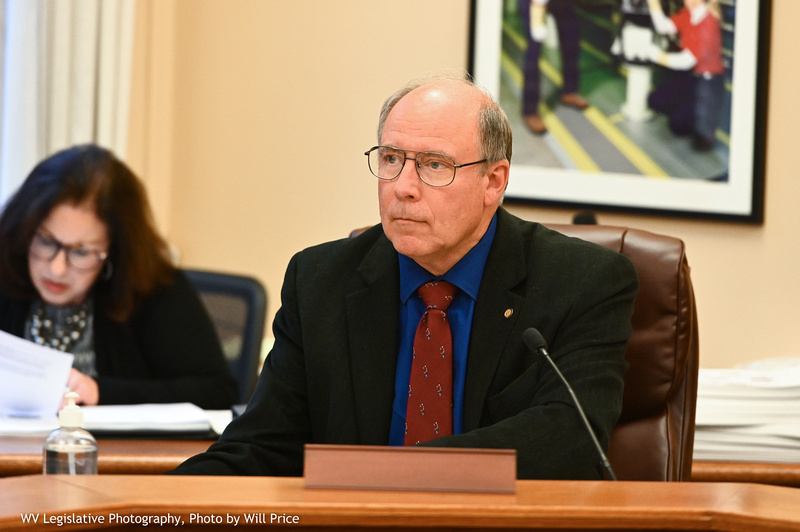 The agency provided a report on the Feed to Achieve Program. During the pandemic, breakfast and lunch were provided to students at home. More families were served than during a normal school year. Meals and resources were also provided to nonpublic school students. There was a huge increase due to the free lunch program. Several counties are taking advantage of the federal community eligibility program which provides funding for students to receive breakfast and lunch. The backpack program is still in place, providing food for students to have during the weekend.
The agency provided a report on the Feed to Achieve Program. During the pandemic, breakfast and lunch were provided to students at home. More families were served than during a normal school year. Meals and resources were also provided to nonpublic school students. There was a huge increase due to the free lunch program. Several counties are taking advantage of the federal community eligibility program which provides funding for students to receive breakfast and lunch. The backpack program is still in place, providing food for students to have during the weekend.
The agency updated the committee on safety and security measures the county boards have put in place or upgraded. New safety measures have been implemented. All special education classrooms have cameras now. Many schools need school resource officers.
Three policies were discussed at the meeting. The policies are open for public comment until December 15. Policy 2315 is a comprehensive school counseling program that identifies responsibilities for the WVBE, county boards, county central office staff, and school. Policy 2322 embeds language from policy 3235 and policy 7300 into a comprehensive policy for the West Virginia System of Support and Accountability. Policy 5100 incorporates language from several policies to create the Approval of Educator Preparation Programs Policy.
Parks, Recreation and Natural Resource Subcommittee 11/14/2021
 The Parks, Recreation, and Natural Resource Subcommittee heard a presentation on using air rifles for big game hunting. Twenty-five states have legalized air guns. Most recently Alaska. These guns do not shoot as far as high-power rifles. They are not as loud. Kids and the elderly can safely use them. They can also be used for city control hunting.
The Parks, Recreation, and Natural Resource Subcommittee heard a presentation on using air rifles for big game hunting. Twenty-five states have legalized air guns. Most recently Alaska. These guns do not shoot as far as high-power rifles. They are not as loud. Kids and the elderly can safely use them. They can also be used for city control hunting.
Joint Legislative Oversight Commission on Department of Transportation Accountability 11/14/2021
Transportation Secretary Jimmy Wriston told lawmakers that West Virginia urgently needs the money and support from the national infrastructure bill.
Specifically, Winston mentioned Corridor H, the Coalfields Expressway, and the King Coal Highway. Corridor H is s an Appalachian Highway that cuts through West Virginia’s central mountains to Virginia.
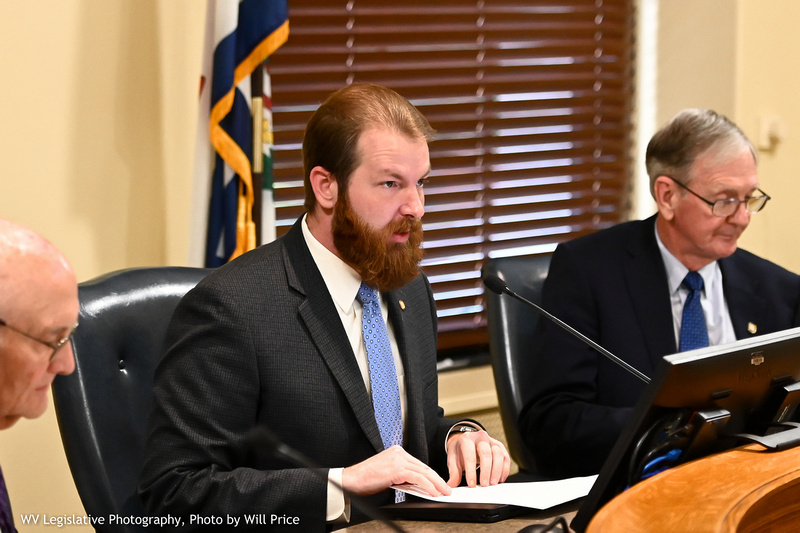 The Coalfields Expressway, or U.S. 121, is a multi-lane highway connecting the West Virginia Turnpike at Beckley with U.S. 23 at Slate, Va.
The Coalfields Expressway, or U.S. 121, is a multi-lane highway connecting the West Virginia Turnpike at Beckley with U.S. 23 at Slate, Va.
The King Coal Highway is a four-lane highway running 95 miles across southern West Virginia.
Only small portions of these projects are open after years of work.
Wriston believes his agency can complete them in short order, once clear federal guidance is obtained.
“I believe we can deliver those projects in a time frame that would be unprecedented. I think we can do this,” Winston said. “The only question today is what are the rules, what are the guidelines. We have a good idea of how much money is in each bucket. We have not been sitting around for the past four or five years waiting on this infrastructure bill. We assumed it was happening all along.”
The bill is expected to bring in billions of dollars in investment to West Virginia.
Based on funding formulas, federal leaders believe West Virginia could receive $3 billion for highways programs, $600 million for broadband, almost $500 million for a range of water quality improvements, more than $500 million for bridges, nearly $200 million for statewide transit and $43 million for airports.
In addition, there would be at least $700 million for the cleanup of mine property that was abandoned long ago. The money would also be dedicated to the cleanup of orphaned gas wells.
Joint Standing Committee on the Judiciary 11/15/2021
The Judiciary Committee heard presentations on the 2021 redistricting plans. Counties are now working on redistricting precincts. Mapping Vendors are being used for precinct mapping. Once the mapping is complete the public will be map aware of which precinct they should be voting. There is a concern about the timeframe for the process to be completed but counties are working diligently to complete it on time.
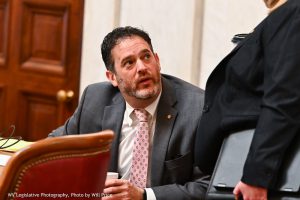 While most think of the census coming around once every decade, the process is broader than that. The cycle begins about mid-decade. Not all counties submitted precinct data throughout the census cycle. Thirteen counties did not submit dull data. West Virginia was one of five states that did not submit some or all data. While the House was creating districts, block anomalies were found in Morgan County with the mountains and ridges and blocks within blocks (blocks surrounded by another). Adjusting the blocks will begin now instead of in 2030.
While most think of the census coming around once every decade, the process is broader than that. The cycle begins about mid-decade. Not all counties submitted precinct data throughout the census cycle. Thirteen counties did not submit dull data. West Virginia was one of five states that did not submit some or all data. While the House was creating districts, block anomalies were found in Morgan County with the mountains and ridges and blocks within blocks (blocks surrounded by another). Adjusting the blocks will begin now instead of in 2030.
The committee also heard from the Secretary of State on election law requests. Several laws have been requested including, laws relating to absentee voting, contesting elections, moving municipal elections and levee elections, changing the deadline for online voter registration, amending the coting and canvas system, and creating a new crime for interfering with voter transportation to and from elections.
Select Committee on PEIA, Seniors and Long-Term Care 11/15/2021
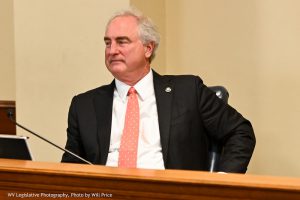 The committee heard recommendations for improving and expanding access to Medicaid long-term supports and services. West Virginia’s AARP officials presented that AAEP is the largest nonprofit, nonpartisan organization dedicated to helping people decide how they live as they age. West Virginia Medicaid cost is higher than neighboring states. The state’s costs are in the top time in the country, near the costs in New York and Massachusetts.
The committee heard recommendations for improving and expanding access to Medicaid long-term supports and services. West Virginia’s AARP officials presented that AAEP is the largest nonprofit, nonpartisan organization dedicated to helping people decide how they live as they age. West Virginia Medicaid cost is higher than neighboring states. The state’s costs are in the top time in the country, near the costs in New York and Massachusetts.
AARP recommends using American Rescue funds for home repairs for the elderly to help maintain residence in homes instead of being moved to nursing homes. Adult Day Centers would be helpful in West Virginia so that caregivers can still work full-time while keeping the elderly safe and cared for. If the elderly could stay home and receive care, the state would save $7 million in Medicaid.
Joint Standing Committee on Education 11/15/2021
 The committee received a presentation about consolidating county boards of educations. It was introduced as a topic to study. Currently, the state has 55 county boards of educations. From 2013 to 2020 the state had a decline of 10 percent of students. The funding formula is out of date and having so many boards risk having duplications of services. An idea for consolidation would be to use the old RESA system. Currently, each board has five members. It was suggested that during each election, each board would lose a member until a specific number is met. All counties under one board will be equally be represented. These jobs are elected top-level positions. Consolidation could improve services and provide cost savings, which could go to the classrooms.
The committee received a presentation about consolidating county boards of educations. It was introduced as a topic to study. Currently, the state has 55 county boards of educations. From 2013 to 2020 the state had a decline of 10 percent of students. The funding formula is out of date and having so many boards risk having duplications of services. An idea for consolidation would be to use the old RESA system. Currently, each board has five members. It was suggested that during each election, each board would lose a member until a specific number is met. All counties under one board will be equally be represented. These jobs are elected top-level positions. Consolidation could improve services and provide cost savings, which could go to the classrooms.
Bluefield State College presented that they have 14 new programs they want to offer and have the money to do but need the approval to move forward. The issue is that the programs they want to offer are typically community college (two-year) programs, which usually are not offered at a four-year institution. Larger universities do not need the approval to have such programs. They stated that they have been told duplication of programs and competition is the reason they must receive approval from local community colleges. However, competition already exists within the state. Also, out-of-state programs can compete here.
Special Committee on Viability of WV Veterinary Medicine School – Higher Education 11/15/2021
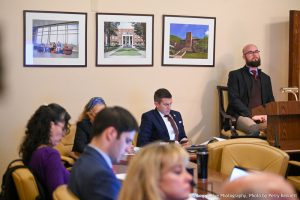 The Special Committee met for the first time to discuss the viability of a Veterinary Medicine School in West Virginia. A study found that a Vet Med school is viable in the state. Currently, WV students must go out of state for a veterinary medicine program. Ohio, Pennsylvania, and Virginia-Maryland (joint program) all have programs.
The Special Committee met for the first time to discuss the viability of a Veterinary Medicine School in West Virginia. A study found that a Vet Med school is viable in the state. Currently, WV students must go out of state for a veterinary medicine program. Ohio, Pennsylvania, and Virginia-Maryland (joint program) all have programs.
In-state tuition would be lower and make this program cheaper for West Virginia residents. The employment growth in veterinary medicine is 14,500 positions in the next 10 years and this does not include the additional 4,400 openings that will come per year from retirement, change of profession, etc. There is an increasing need for school. There is a severe need across the country for rural veterinarians. In West Virginia, eight counties do not have a registered vet.
Joint Committee of Technology 11/16/2021
 The committee received an update on the middle mile broad bang expansion into southern West Virginia and prospects. In early 2021, Appalachian Power and Wheeling Power applied to PSC to expand broadband in unserved areas of Lucan and Mingo Counties. The request was approved with an investment of $61.3 million.
The committee received an update on the middle mile broad bang expansion into southern West Virginia and prospects. In early 2021, Appalachian Power and Wheeling Power applied to PSC to expand broadband in unserved areas of Lucan and Mingo Counties. The request was approved with an investment of $61.3 million.
Appalachian Power has entered a lease with GigaBeam Networks for six fiber strands. A construction schedule has been developed with Logan and Mingo Counties being prioritized. The first poles to be placed along with shelter buildings for equipment are expected to be completed during the 1st quarter of 2022. The companies have also partnered with the county commissions to apply for grant funding. Future prospects include identifying unserved areas and customers in Mercer, McDowell, Wyoming, Raleigh, Summers, and Monroe counties.
Legislative Oversight Commission on Health and Human Resources Accountability 11/16/2021
 The Bureau for Children and Families provided a general update on the foster care system. They are working to train kinship parents to become certified foster parents. There are three types of foster care: certified foster, certified kinship, and uncertified kinship. They recommended developing a pilot program to expand funding to uncertified kinship parents. The agency noted that the issues found in the foster care system are not solely a West Virginia problem. These issues are seen across the US. COVID has made it more difficult to find placements because placements can be placed on hold due to exposure.
The Bureau for Children and Families provided a general update on the foster care system. They are working to train kinship parents to become certified foster parents. There are three types of foster care: certified foster, certified kinship, and uncertified kinship. They recommended developing a pilot program to expand funding to uncertified kinship parents. The agency noted that the issues found in the foster care system are not solely a West Virginia problem. These issues are seen across the US. COVID has made it more difficult to find placements because placements can be placed on hold due to exposure.
The Bureau does face increased caseloads with a dwindling workforce. A workload study is ongoing through WVU to determine what the actual caseload is of a CPS worker and to compare salaries. It is expected to be complete by the 2022 session. The agency stated that their recruitment is stable, but retention is difficult. The number one reason for leaving listed on exit surveys is the low salary. Another issue has been the high vacancy rate, which has led to unmanageable caseloads. The agency noted that the Children’s home in Elkins has the potential to benefit many West Virginia kids. However, it will take a serious investment of funds to expand the facility and staff.

